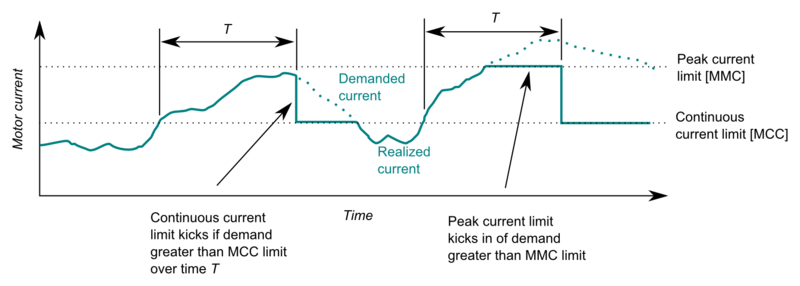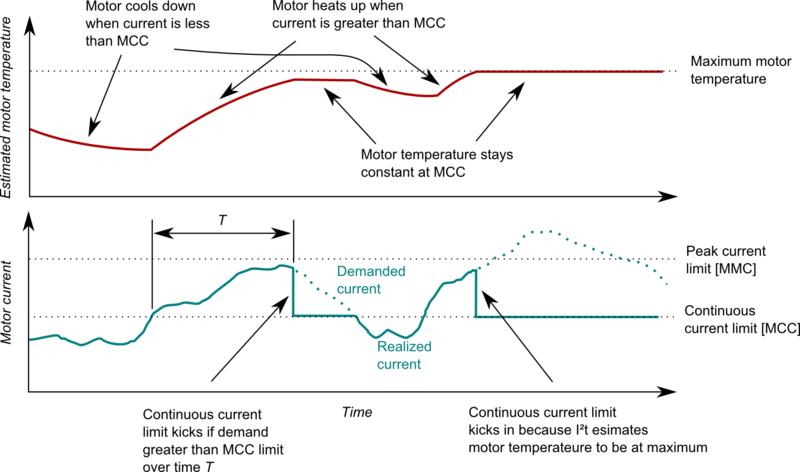Difference between revisions of "Motor peak and continuous current limits"
| [checked revision] | [checked revision] |
m (Text replacement - "\[\[([A-Z]{2,3})\]\]" to "{{param|$1}}") |
|||
| (4 intermediate revisions by the same user not shown) | |||
| Line 1: | Line 1: | ||
All GD motor drives feature a two stage current limit in order to protect motor and drive from overheating damage. | All GD motor drives feature a two stage current limit in order to protect motor and drive from overheating damage. | ||
| − | == | + | ==Description of operation== |
The basic parameters for current limiting are: | The basic parameters for current limiting are: | ||
| − | * | + | *{{param|MMC}} Motor maximum current a.k.a. motor peak current |
| − | * | + | *{{param|MCC}} Motor continuous current a.k.a. motor continuous current |
| − | * | + | *{{param|MTC}} Motor thermal constant time |
*Peak current time limit ''T'', normally a fixed value of 1 or 2 seconds depending on drive model | *Peak current time limit ''T'', normally a fixed value of 1 or 2 seconds depending on drive model | ||
| + | |||
[[File:Currentlimits graph.png|800px]] | [[File:Currentlimits graph.png|800px]] | ||
| + | |||
In ideal case drive would output the demanded current always. However due to the fact that motor and drive generates more heat when current is higher, it is necessary sometimes to reduce output current to a safe level. | In ideal case drive would output the demanded current always. However due to the fact that motor and drive generates more heat when current is higher, it is necessary sometimes to reduce output current to a safe level. | ||
| Line 13: | Line 15: | ||
* Drive outputs demanded current infinitely if demand is below MCC level | * Drive outputs demanded current infinitely if demand is below MCC level | ||
* Drive outputs demanded current if demand is below MMC and time limit T has not been exceeded | * Drive outputs demanded current if demand is below MMC and time limit T has not been exceeded | ||
| − | * Drive | + | * Drive refuses to drive current above continuous level if I<sup>2</sup> protection estimates motor temperature to be at maximum (see below). |
==I<sup>2</sup>t motor thermal modeling== | ==I<sup>2</sup>t motor thermal modeling== | ||
| Line 19: | Line 21: | ||
If motor is being driven long enough above continuous current limit, motor temperature will rise to a level where I<sup>2</sup>t will prevent drive from driving current above MCC. | If motor is being driven long enough above continuous current limit, motor temperature will rise to a level where I<sup>2</sup>t will prevent drive from driving current above MCC. | ||
| + | |||
[[File:Currentlimits graph i2t.png|800px]] | [[File:Currentlimits graph i2t.png|800px]] | ||
| + | |||
MTC parameter sets the speed of motor temperature change. Larger motors have greater mass which heats up slowly giving them large thermal time constant while small motors heat up very quickly thus their MTC value is low. | MTC parameter sets the speed of motor temperature change. Larger motors have greater mass which heats up slowly giving them large thermal time constant while small motors heat up very quickly thus their MTC value is low. | ||
Latest revision as of 19:54, 28 August 2015
All GD motor drives feature a two stage current limit in order to protect motor and drive from overheating damage.
Description of operation[edit | edit source]
The basic parameters for current limiting are:
- Peak current limitMMC Motor maximum current a.k.a. motor peak current
- Continuous current limitMCC Motor continuous current a.k.a. motor continuous current
- Thermal time constantMTC Motor thermal constant time
- Peak current time limit T, normally a fixed value of 1 or 2 seconds depending on drive model
In ideal case drive would output the demanded current always. However due to the fact that motor and drive generates more heat when current is higher, it is necessary sometimes to reduce output current to a safe level.
- Drive outputs demanded current infinitely if demand is below MCC level
- Drive outputs demanded current if demand is below MMC and time limit T has not been exceeded
- Drive refuses to drive current above continuous level if I2 protection estimates motor temperature to be at maximum (see below).
I2t motor thermal modeling[edit | edit source]
As mentioned earlier, continuous current limit may kick in also due to motor thermal limit. Drive's I2t protection continuously estimates motor temperature based on history of driven current and motor thermal time constant MTC value.
If motor is being driven long enough above continuous current limit, motor temperature will rise to a level where I2t will prevent drive from driving current above MCC.
MTC parameter sets the speed of motor temperature change. Larger motors have greater mass which heats up slowly giving them large thermal time constant while small motors heat up very quickly thus their MTC value is low.
Physical definition of time constant is the time where measured variable (in this case temperature) has risen to 63% of final settling value under constant driving.

